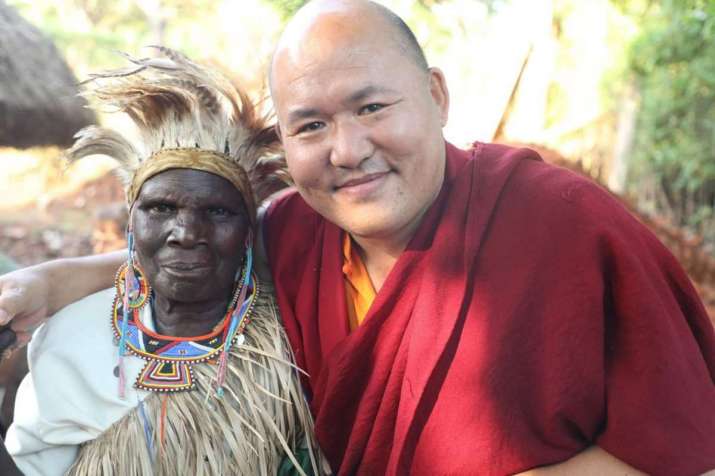
Drupon Khen Rinpoche Karma Lhabu (b. 1969) is a master who has studied with more than 20 eminent teachers, among them Khenchen Thrangu Rinpoche (b. 1933), Khenpo Chöje Jigme Phüntsok (1933–2004), Khenchen Pema Tsewang (1931–2002), and Drupon Rinpoche Karma Sherab (1922–92).
After 2017, the year of his first visit to Africa, Drupon Khen Rinpoche Karma Lhabu began to teach at Tara Rokpa Centre in Groot Marico, South Africa, and Samye Ling Harare, in Zimbabwe. In March 2018, his teacher Khenchen Thrangu Rinpoche bestowed the reading transmission for the Short Vajradhara Prayer, the heart of the Kagyu instructions, upon five young African-born monastics called the Five Chosen for Trial from Africa, a reference to the original Seven Chosen for Trial, who were the first Tibetans ordained during the reign of the Tibetan emperor Trisong Detsen (742–97).
In December 2018, Drupon Khen Rinpoche Karma Lhabu visited the Hong Kong branch of Thrangu Vajrayana Buddhist Centre, which was celebrating its 30th anniversary.
Buddhistdoor Global: Thank you for taking the time to sit down with us, Rinpoche. What has occupied you since your arrival in Hong Kong?
Drupon Khen Rinpoche Karma Labhu: My main purpose for visiting Hong Kong this year is to visit the Thrangu Dharma Centre, which is celebrating its 30th anniversary. My overall aim is to benefit all sentient beings, but such an objective is extremely difficult to achieve. So at the moment I’m focusing specifically on human beings, and then even more specifically, in this case, the people of Hong Kong. The way in which I wish to help them is to offer them advice that will hopefully improve their outlook on the world and their way of thinking and seeing things.
BDG: What have your students here indicated to you about what makes them unhappy, or areas where they would like to improve their outlook?
KL: Of course, there is a real variety in what people say, and people usually talk to me in the context of Buddhism, so the issues they bring to me will be things like, “I have so much anger and jealousy; I find these so hard to deal with. What can I do to overcome them?” Obviously there is nothing good about anger, pride is no good, jealousy is no good—they all cause so many problems. So people do see that they should try to do something about them. Aside from these internal difficulties, many people also seek advice for the difficulties they experience in their family life and at work.
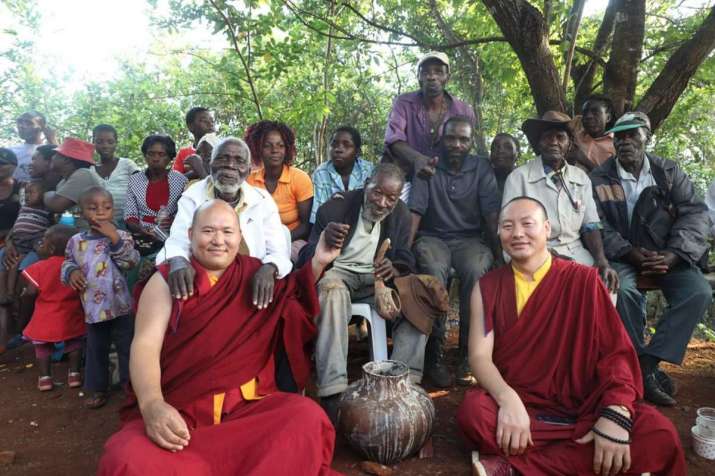
BDG: What is the best way to operate in the modern world, which is so reactive, where we often find ourselves reacting without paying proper attention to our state of mind?
KL: I think there are two main Buddhist practices we can train in that will help. The first is mindfulness. When we are mindful, we are alert, and with alertness we are more capable of telling whether our reactions are appropriate or not.
The second is being of few desires and being easily satisfied, which is simply to think and feel, “I’m fine as I am, and I accept that I’m okay and have everything I need.” When we have a constant mindset of “I’m not right as I am, I’m not good enough, I should have more, I should be more,” and never feel satisfied or content, it really agitates our mind and destroys any sense of contentment. This mindset is especially prevalent in cities. You’ll know that mental illness in big cities is on the rise, and in prosperous communities people are suffering from a lack of inner wellbeing.
Constant discontentment is the source of these problems—thoughts of “I need this,” “That is not right,” “If only it were like this.” As long as we always wish for things to be other than they are, we will never be happy. First we want a hundred thousand dollars, and once we have that we want two hundred thousand. We want a home to live in, and once we have that, we want a second one, a holiday home in the countryside. This way of thinking totally robs us of our peace of mind.
I think we should not be too concerned with the future, in the sense of thinking too far ahead, of how successful we will be and where we want to be. It would be better to concentrate our efforts to ensure that whatever we are doing here and now is done to the best of our ability; rather than burdening ourselves with heavy expectations and high hopes for the future. If we are doing what we need to do now well and properly, we will find that our future will just naturally be successful.
BDG: Some people might want to live a more Buddhist way of life, but are surrounded by influences, non-religious or otherwise, that do not approve of or understand their spiritual path. Does Rinpoche have any advice about managing such influences or environments?
KL: There are different aspects of Buddhism, as you know, and some aspects put more emphasis on external elements, like reading prayers, chanting mantras, performing rituals, and so on. People who choose to emphasize that side of the practice may find themselves clashing with those who do not share the same beliefs, or even with those from different Buddhist schools. There might be differences or even discord.
If we intentionally decide to be more incognito with these external elements, and instead focus on the Buddhist outlook and way of thinking, then I cannot see that we will find ourselves coming into conflict with or upsetting others. When we think of our Buddhist practice as an outlook or mindset, we will have no issues, but if, from the start, we focus only on externalities, then we’ll likely have problems. If we take meditation as an example, all spiritual traditions (and nowadays secular traditions too) share some idea of meditation, even though they might be found to be quite different when one delves into the view and theory of each. Like meditation, if we keep to the core Buddhist practices, such as being kind and of service to others, I can’t imagine how that would upset anyone.
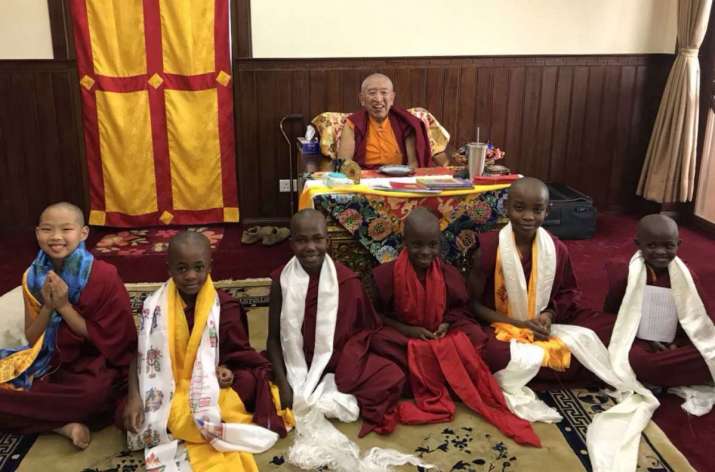
BDG: Some people have a tendency to import materialist values into their practice of Buddhism, which can take the form of accumulating empowerments, taking refuge under multiple teachers and lineages, and confusing religious externalities with spiritual merit or excellence. Can you share with us what you think about this problem?
KL: Your thoughts and my thoughts are the same on this. I often talk about how people carry around a stack of refuge cards, and I often speak at length about how this is not the way to go about things. Whatever activity we’re engaged in, whether religious or secular, we must be consistent, working with a degree of stability rather than being flaky. If we have too many thoughts and too many ideas, things will not go well and our path will not be smooth.
The way to go about things when studying and practicing the Dharma is to take learning and studying as the foundation, and work under the guidance of a skilled teacher. But if we emphasize only recitation and ritual without the learning component, our foundation will be shaky.
People go running from this lama to that lama, without really being aware of who they are, or what their background is, only interested in whether the lama has a big name or a fancy title. It is unlikely that one will turn out to be a very good Buddhist if one is only chasing after externalities like refuge cards, prayers, and empowerments.
Normal worldly people have mundane problems, but they don’t have the issues that come with religion, which could be considered to be additional. But those who are already living their mundane lives and then choose to enter the Dharma can end up with two sets of problems if they don’t know how to engage with the latter properly! Mistaken Buddhists could end up with more problems than they started with. You can tell that they are practicing mistakenly if their attachment and aversion gradually increases, rather than receding through correct practice.
Can you find your own faults honestly? If you can use the Dharma as a tool to discern and fix your shortcomings, then you will truly benefit yourself and other beings.
BDG: Thank you Rinpoche, any concluding thoughts for your students and our readers?
KL: If you can benefit all sentient beings, that would be the highest ideal. If you can’t do that, then think about benefiting all human beings equally, regardless of superficial differences. And if you can’t go that far, then maybe we can be motivated towards facilitating harmony between the world’s religious traditions. If not even that, we should at least try to promote harmony among Buddhists. At the moment there is still a feeling of separateness or division among followers of the Three Vehicles. This is a cause of unnecessary strife. My hope is that we can all work together to bring about harmony and unity.
See more
An introduction to Drupon Khen Rinpoche Karma Lhabu
The Five Chosen for Trial from Africa (Drupon Khen Rinpoche Karma Lhabu)
The Excellent Beginning for Those Chosen for Trial from Africa (Drupon Khen Rinpoche Karma Lhabu)





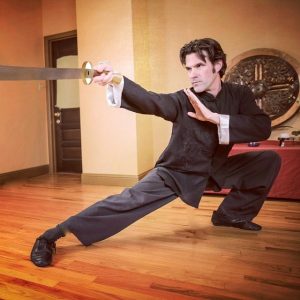







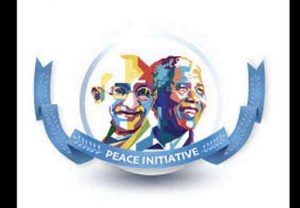

Wonderful messages for harmony within and without the globe for all peoples